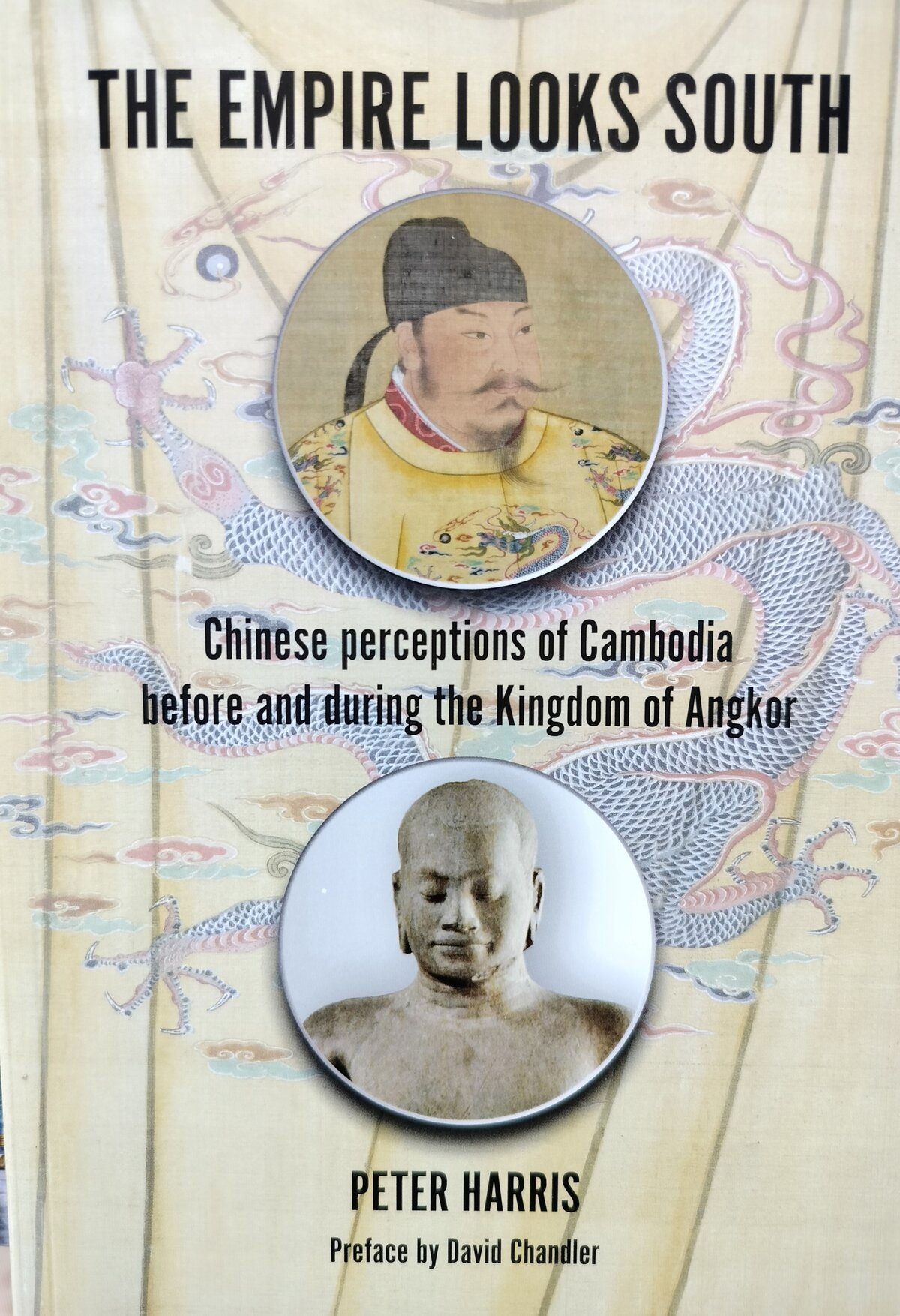The Empire Looks South: Chinese perceptions of Cambodia before and during the Kingdom of Angkor
by Peter Harris
Probably the most exhaustive study on Chinese descriptions and perceptions of Cambodia in pre-Angkorean and Angkorean times.

- Formats
- ADB Physical Library, paperback
- Publisher
- Silkworm Books, Bangkok | Preface by David Chandler
- Published
- 2023
- Author
- Peter Harris
- Pages
- 388
- ISBN
- 978-616-215-198-9
- Language
- English
“It’s always worthwhile, opening a book,” wrote the early Chinese poet Tao Yuanming, and this wisdom particularly applies to the present one: in the maze of centuries of accounts by Chinese ‘envoys, officials, Daoists, Buddhists, and others’ — including Zhou Daguan’s description of Zhenla (Chenla) and the less referred-to Zhao Rugua’s [1] Zhu fan zhi (Treatise on the Various Foreigners) –, the author leads us into a journey where we are invited to reconsider our vision of Ancient Cambodia.
With a rich apparatus of notes, appendices and a useful Index (a tool too often neglected in nowadays publication), The Empire Looks South combines the accounts from official sources, from Buddhist monks, from Daoists in search of immortality, and from merchants only looking for terrestral rewards.
Even if Chinese emperors have kept geographical observations and official mission records, so many sources have been lost that historians keep guessing about the real size and structure of Funan and Chenla. For instance, what exactly wrote Zhu Zhi, also called Zhu Jian’an, who authored in the late 5th century Funan ji (A Record of Funan), of which only few parts have been saved? And when Zhou Daguan listed ten jun (prefectures) of late 13th century Cambodia — Zhenpu, Zha’nan, Bajian, Moliang, Baxue, Pumai, Zighun, Mujinbo, Laigankeng and Basili –, to which territories and cities was he referring to?
For each name, the author offers only suggestions: Zhenpu was ‘a frontier town on the southeastern coast of present-day Vietnam’ [Oc Eo?]; Zha’nan ‘a Mekong River town, perhaps the present-day town of Kompong Chhnang’; Bajian ‘was south of Zhenpu’; Moliang, or Malan, ‘may refer to a place in Battambang’; Baxue ‘perhaps Pakse in the south of present-day Laos’; Pumai ‘likely to be Phimai in present-day Thailand”; Zighun ‘possibly Saigon, now Ho Chi Minh Ville’; Mujinbo, ‘location unknown’; Laigankeng, ‘location unknown’; Basili, or Bosilan, ‘south of Zhenla’.
Sometimes, etymology fails us when trying to understand realities that impressed Chinese travelers and were recorded as distinctive traits of Ancient Cambodia. For instance, both Zhao Rugua (circa 1220) and Zhou Daguan (1296−7) were fascinated by “three hundred dancing girls presenting food to the Buddha every day“in the temples of Angkor, and the former called them a’nan 阿南, ‘a term of unknow derivation’. The author suggests they were devadasi, ‘Hindu temples dancers associated in palace rituals’ who he himself witnessed performing in the Jagannath temple in Puri, Odisha, India. The devadasi, persecuted by the British colonial authorities who considered them as mere prostitutes, were girls dedicated to temples, a traditional system that was abolished by the 7 Oct 1947 Madras Devadasi Act in independent India.
[1] Sinologist Pascal Medeville contests the transliteration of Zhao Rugua for 赵汝适, claiming that it should be Zhao Rukuo.
About South India’s Devadasi, see Shreya Shankar and Pranav Ganesan, “The Devadasis, Dance Community of South India: A Legal and Social Outlook”, International Journal on Minority and Group Rights 29 (1): 1 – 39, August 2021.
Tags: Champa, Funan, Chinese sources, perfumes, Chinese trade, Chenla, Linyi, dance
About the Author

Peter Harris
Peter Harris is a New-Zealand independent researcher and philanthropist who has been visiting and researching Angkor since the 1960s, and has published his own translation of Zhou Daguan’s travelogue to Zhenla (Chenla).
With a PhD in Asian history from Monash University, an M Phil in international relations from Oxford University, and a BA (Hons) in Chinese from Oxford University, he was before 2000 Director of Asian Studies, Senior Fellow in Strategic Studies, and Acting Director of the New Zealand Contemporary China Research Centre at Victoria University of Wellington, NZ, a lecturer at Sun Yat-sen University, Guangzhou, and visiting professor at Nanjing University, Nanjing, China. Since 2000 he has undertaken long-term civil society assignments in Indonesia, Cambodia, Kazakhstan and Myanmar.
In earlier years he served as the Oxfam (UK) Representative in Cambodia and Odisha, India; head of Asia research at the International Secretariat of Amnesty International; head of the Chinese section of the BBC’s External Services; Asia Program Officer and Representative for China of the Ford Foundation; and founding Executive Director of the Asia New Zealand Foundation.
About his translation and presentation of Zhou Daguan’s A Record of Cambodia, its land and its people (Silkworm Books, Bangkok, 2007, ISBN 9789749511244), David Chandler wrote that “Peter Harris has given a new generation of readers a masterly version of Zhou’s timeless and fascinating account that scholars of Cambodia are sure to relish and visitors to Angkor are sure to enjoy.”
Recently, Dr. Peter Harris authored a new edition of Sun Tzu’s Art of War (Everyman’s Library, 2018), and The Empire Looks South: Chinese Perceptions of Cambodia before and during the Kingdom of Angkor (Silkworm Books, Chiang Mai, 2023. ISBN 9786162151965).
